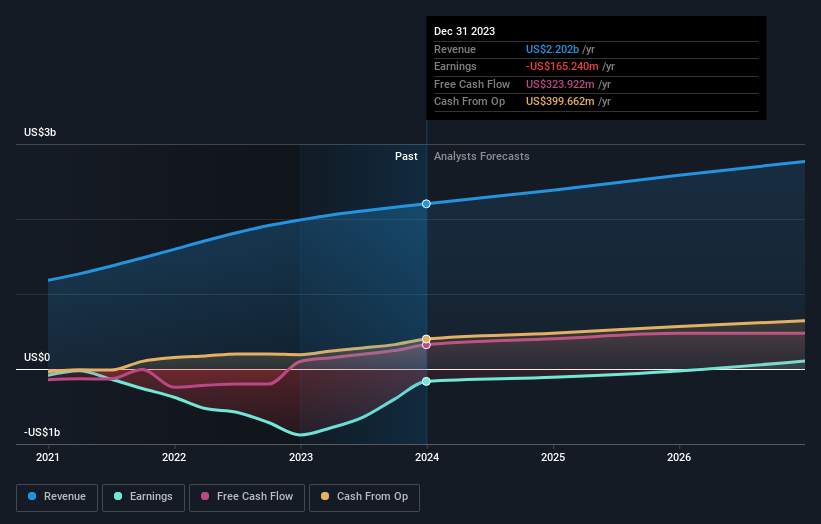Investors in RingCentral (NYSE:RNG) have unfortunately lost 89% over the last three years
As an investor, mistakes are inevitable. But really big losses can really drag down an overall portfolio. So take a moment to sympathize with the long term shareholders of RingCentral, Inc. (NYSE:RNG), who have seen the share price tank a massive 89% over a three year period. That'd be enough to cause even the strongest minds some disquiet. While a drop like that is definitely a body blow, money isn't as important as health and happiness.
Since shareholders are down over the longer term, lets look at the underlying fundamentals over the that time and see if they've been consistent with returns.
See our latest analysis for RingCentral
RingCentral isn't currently profitable, so most analysts would look to revenue growth to get an idea of how fast the underlying business is growing. When a company doesn't make profits, we'd generally hope to see good revenue growth. Some companies are willing to postpone profitability to grow revenue faster, but in that case one would hope for good top-line growth to make up for the lack of earnings.
In the last three years, RingCentral saw its revenue grow by 20% per year, compound. That's well above most other pre-profit companies. So why has the share priced crashed 24% per year, in the same time? The share price makes us wonder if there is an issue with profitability. Sometimes fast revenue growth doesn't lead to profits. Unless the balance sheet is strong, the company might have to raise capital.
The graphic below depicts how earnings and revenue have changed over time (unveil the exact values by clicking on the image).
RingCentral is well known by investors, and plenty of clever analysts have tried to predict the future profit levels. If you are thinking of buying or selling RingCentral stock, you should check out this free report showing analyst consensus estimates for future profits.
A Different Perspective
RingCentral shareholders are up 9.8% for the year. Unfortunately this falls short of the market return. But at least that's still a gain! Over five years the TSR has been a reduction of 11% per year, over five years. It could well be that the business is stabilizing. It's always interesting to track share price performance over the longer term. But to understand RingCentral better, we need to consider many other factors. Take risks, for example - RingCentral has 1 warning sign we think you should be aware of.
If you would prefer to check out another company -- one with potentially superior financials -- then do not miss this free list of companies that have proven they can grow earnings.
Please note, the market returns quoted in this article reflect the market weighted average returns of stocks that currently trade on American exchanges.
Have feedback on this article? Concerned about the content? Get in touch with us directly. Alternatively, email editorial-team (at) simplywallst.com.
This article by Simply Wall St is general in nature. We provide commentary based on historical data and analyst forecasts only using an unbiased methodology and our articles are not intended to be financial advice. It does not constitute a recommendation to buy or sell any stock, and does not take account of your objectives, or your financial situation. We aim to bring you long-term focused analysis driven by fundamental data. Note that our analysis may not factor in the latest price-sensitive company announcements or qualitative material. Simply Wall St has no position in any stocks mentioned.

 Yahoo Finance
Yahoo Finance 
